Innovative Heart Treatments
Here’s some information you can include in a blog about Innovative Heart Treatments:
Minimally Invasive Heart Surgery
- Advances in heart surgery have led to the development of minimally invasive procedures. These techniques use smaller incisions than traditional surgery, which helps reduce recovery time, pain, and the risk of infection. One example is robotic-assisted heart surgery, which uses specialized robotic arms for precision during surgery, allowing for faster recovery and less scarring.
Transcatheter Aortic Valve Replacement (TAVR)
- TAVR is an innovative procedure used to treat aortic stenosis, a condition where the aortic valve narrows, making it harder for blood to flow out of the heart. Traditionally, patients would require open-heart surgery, but TAVR allows for the replacement of the valve through a catheter inserted into a blood vessel, offering a less invasive alternative for patients who may not be candidates for traditional surgery.

Gene Therapy and Stem Cell Treatments
- Gene therapy is being researched as a way to treat certain types of heart disease by introducing healthy genes into the heart to repair damaged tissue. Similarly, stem cell therapies are showing promise in regenerating heart tissue that’s been damaged by heart attacks or chronic conditions. These treatments have the potential to promote healing and recovery by encouraging the growth of new heart cells.
Left Ventricular Assist Devices (LVADs)
- LVADs are mechanical pumps used to assist the heart in pumping blood, particularly for people with severe heart failure. LVADs are an alternative for patients who are waiting for a heart transplant or for those who may not be candidates for a transplant. Recent innovations have led to more compact and efficient devices, improving patient comfort and quality of life.
Wearable Heart Monitoring Devices
- New wearable technologies, such as smartwatches and patches, now have the ability to monitor heart rate, blood pressure, and even detect irregular heart rhythms (like atrial fibrillation). These devices allow patients and doctors to track heart health in real time and can provide early warning signs for heart issues, allowing for prompt intervention and better management of heart conditions.
Cryoablation for Arrhythmias
- Cryoablation is a technique that uses extreme cold to freeze and destroy abnormal heart tissue that causes arrhythmias (irregular heartbeats). This minimally invasive procedure is particularly effective for certain types of arrhythmias, and it has fewer risks and a quicker recovery time compared to traditional open-heart procedures.
Heart Failure Devices: Impella and CardioMEMS
- Impella is a device used for heart failure patients to help pump blood while the heart is recovering or waiting for a transplant. It can support the heart during high-risk procedures, like coronary artery bypass grafting (CABG).
- CardioMEMS is a sensor placed in the pulmonary artery that continuously monitors the heart's pressure. This allows doctors to make real-time adjustments to treatments, improving heart failure management and reducing hospital readmissions.
Personalized Medicine and Precision Heart Care
- Advances in genomics and biomarker testing are enabling doctors to personalize heart treatments based on a patient’s genetic makeup. This approach allows for more targeted therapies, increasing the likelihood of success in treating conditions like coronary artery disease, heart failure, and even preventing heart attacks.
Robotic-Assisted Coronary Artery Bypass Surgery (CABG)
- Traditional coronary artery bypass graft (CABG) surgery involves creating bypasses around blocked arteries. Robotic-assisted CABG allows for greater precision and smaller incisions, reducing pain and speeding up recovery. This innovation minimizes the trauma typically associated with open-heart surgery and offers patients a quicker return to normal activities.
Artificial Intelligence in Heart Disease Diagnosis
- Artificial Intelligence (AI) is revolutionizing how heart conditions are diagnosed and treated. AI-powered tools analyze large amounts of patient data, such as medical records, test results, and imaging scans, to identify patterns that may indicate heart disease. These tools help doctors make more accurate and timely diagnoses, leading to better treatment outcomes.